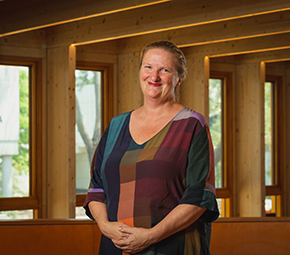With textile waste fast becoming one of the planet’s most pressing environmental challenges, an innovative startup is working to embed sustainability in the everyday, creating durable, affordable, ethically-produced schoolwear options that are healthy for kids and the planet.

“Hundreds of tonnes of non-wearable school uniforms go to landfill each year, ” explains Sustainable Schoolwear founder Anne Thompson. “If all 3.9 million Australian students threw away just one polo shirt each of their 13 school years, this would equate to over 8,619 tonnes – the weight of 206 humpback whales. But if made from good recycled polyester the average school polo could be upcycled again into new products such as furniture, acoustic tiles or more polyester fibre. It also takes fossil fuels out of polyester production.”
Sustainable Schoolwear offers an ever-expanding range of school uniform basics, including a quick-dry polo shirt made from 100 per cent recycled plastic bottles, this helps keep plastics out of our oceans and landfills and preserve virgin natural resources. Thompson’s journey began in 2016 with an acquisition of organic schoolwear stocks from a failing business, falling for the fully organic dresses created for an inner-Sydney public school. But delivering her first order was both an expensive reality check and a lightbulb moment.
“The parents’ response was that they didn’t want to iron it – and I get that, I don’t want to iron either. And that made me realise that as beautiful as something is, if it’s not functional then it’s not going to fly.”
Committing to creating a 50/50 range blending organic cotton and recycled polyester, Thompson embarked on a steep learning curve. She had never made anything in her life, and had to be across textiles, sustainability, manufacturing and business. Tapping into her superannuation and the time and goodwill of family members, she painstakingly grew the business from three to 25 schools in around 18 months. Joining the Macquarie University Incubator in January 2019 was a crucial pivot point.
“We went from working out of storage units to presenting a professional business to the world. The pitching and mentoring programs were crucial in refining our messages and focusing our efforts, which helped us win the 2019 AMP Tomorrow Fund Grant to launch our pilot program to upcycle old uniforms into new items.”
The first phase of the pilot will define the process and capability for the diversion and upcycling of textile waste, with Sustainable Schoolwear partnering with schools, businesses and individuals to collect 10 tonnes of non-wearable uniforms. The second will model a microfactory capability to turn these non-wearable textiles into new objects or fibres.
“If every school child wore a polo made sustainably and using sustainable fabrics, we could save over two billion litres of water globally and upcycle more than three million plastic bottles. From the pilot will come Worn Up, our charity initiative centred on harnessing the resources in non-wearable textiles to create not just new clothing, but other objects such as moulded plastic school desks. The possibilities are endless.”
It is one of just a few pilot projects chosen to be run by the NSW Government’s Circular Economy Innovation Network initiative, based at the UNSW SMaRT Centre. Thompson is animated by the potential to drive a genuine shift in consumption and manufacturing.
“We’re really going to be able to play around with the possibilities now, and access the resources and partnerships vital to pushing the boundaries. Our vision is to achieve all this at scale, at a national level. It’s not a matter of why would we change – it’s why on earth wouldn’t we.”
So much of the journey is underpinned by education in and with schools. And with children increasingly engaging with – and driving – more sustainable ways of living in a changing climate, school uniforms are an ideal conduit for the bigger message.
“We want to create something that's fully circular, where kids can see that everything we use potentially has multiple purposes, and if it doesn’t, then don’t use it. We also want kids to feel optimistic about their future. Ultimately, being sustainable needs to be mainstream – just a natural part of the process and the fibres and what we want to buy.”